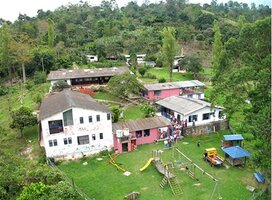Teach English in Colombia
Home to lush rainforests, towering mountains, and vibrant cities, Colombia is a great destination for English teachers eager to live and work in South America. Despite a somewhat turbulent political and social history, Colombia's stability and security is improving.
In order to qualify for English teaching jobs in Colombia, most positions require native proficiency and a bachelor’s degree. Private schools will require TEFL certification or prior teaching experience. The average salary for teaching in Colombia is $700-$1,000 per month. Due to the affordable cost of living, teachers will enjoy a comfortable lifestyle while working in Colombia.
Interested in teaching English in Colombia? We’ve got you covered! Keep reading to learn more about the types of teaching jobs, average salaries and benefits, and how to get a teaching job in Colombia!
Common types of teaching jobs in Colombia include positions at local private institutes and academies or volunteer teaching programs that include a living stipend. The type you choose will depend on your qualifications, experience, and preferences.
Teach English in Colombia Program (TEC)
The SENA National Training Service is a joint initiative among workers, industry owners, and the Catholic Church to provide vocational training to the country's workforce. SENA is a reputable training program, free for students who can't afford it.
With the new government emphasis on English learning, the TEC Teach English in Colombia program, was recently instituted through SENA. TEC volunteers are native speakers from the US with a TEFL certification or one or more years of teaching experience, who teach vocational English to adults.
Private international schools
For those with two or more years of experience, private international schools might be a good place to look for a high-paying job. These English teaching jobs will usually also request native speakers and a TEFL certificate or equivalent and the minimum of a bachelor’s degree.
Private language institutes
For a job teaching English in a private language institute, you may only need a college degree to qualify. The best way to find these teaching jobs is to arrive in the country and apply in-person.
Just like you would expect anywhere in the world, finding a job can be difficult if you don’t know where to look. Universidad EAFIT, a private university, is a popular place to work as a TEFL instructor. EAFIT has three locations with a language institute within it.
Colombo Americano is another private English language institute located throughout Colombia that is supported by the US Embassy. Both of these are great options and would hire a qualified native English speaker.
Public high schools
Due to Colombia's new government initiative, many public schools are now hiring foreign teachers to co-teach in English classes. While these jobs may have slightly lower pay, you can rest assured that your job is making a difference to the students you teach.
An English teacher's monthly salary in Colombia is between $700-$1,000 USD. The average salary of an ESL teacher in Colombia depends on the job and level of experience.
Private language tutors typically charge $12-27 USD an hour depending on experience and location.
TEC and most public school volunteers make a stipend of around $500 USD a month, which should cover basic living costs, especially if volunteers share apartments with one another.
Common benefits for teachers
Private school jobs will also typically include a housing stipend, airfare, health insurance, and more, while a language institute may have a lower salary without providing any of these things.
Read more: How Much Money Can You Save Teaching Abroad?
Cost of living in Colombia
The cost of living varies widely in Colombia, depending on where in the country you reside. Costs will also depend on your spending habits, frequency of travel, and hobbies.
- Food: $75-$100 USD per month
- Transportation (monthly pass): $20-$45 USD per month
- Entertainment: $50-$100 USD per month
- Housing: $200-$500 USD for a one-bedroom apartment depending on city
- Utilities: $15-$40 USD per month
Source: Numbeo
Where and how to find housing
A popular way of finding accommodation is walking around your desired neighborhood to look for "se arrienda" (for rent) signs. Some private landlords don’t list their apartments online so you may be able to find a diamond in the rough with this method.
If you prefer to search online, shared housing can be found on sites like Comparto Apto and you can use Encuentra24 for entire apartments.
As with starting a job in any new country, it's important to do your research before coming to Colombia. Start by exploring these major teaching cities in Colombia:
English teaching jobs in Bogotá
Bogotá, the capital, has no shortage of job opportunities for enthusiastic teachers. Its high altitude and subtropical climate mean the city sees sunshine year-round. It’s also considered the education and culture capital of the country.
English teaching jobs in Medellin
Medellin, the second-largest city in Colombia, is a great place to live and work. Residents of Medellin are referred to as Paisas and take pride in their city. Arts and culture play a big role here and offer endless opportunities to immerse yourself in music, dance, and a growing culinary scene.
English teaching jobs in Cartagena
The port city of Cartagena is the perfect location for teachers who love the beach and the sea. Located on the northern coast, it also provides easy access to Central America and the Caribbean. As the fifth largest city by population, you’ll find a city that provides a lot of opportunities while also feeling smaller and more intimate.
The best way to secure a job in Colombia is to search locally. Many employers won’t hire teachers from abroad. They prefer to meet and speak to potential candidates in person. If you want to have a position secured from your home country, consider going with a program that places teachers around Colombia.
Where to find jobs
While private language institution jobs are best found on the ground, if you're looking for English teaching jobs in Colombia at a public school or through the TEC program, your best option is to apply in advance of arriving through one of the many programs that will place you at a school or SENA (National Training Service) center.
When to apply
If you plan to teach at a private language academy, arrive in November, December, or January for your best chances in finding work for the new semester. For the TEC program, placements begin in January so applications should be sent between September through December of the previous year.
Qualifications needed
To teach English in Colombia you’ll need at least a TEFL certificate and bachelor’s degree for most positions. Some private language academies may accept teachers without a degree, though bigger name centers like Colombo Americano require at least a bachelor’s in English or linguistics. For teachers with degrees in unrelated subjects, two years of teaching experience is needed.
Read more: What are the Requirements to Teach English Abroad?
Work visa
For the TEC program, participants will be issued a type V Visa which will be valid for the entire time they’re in Colombia teaching and will allow them to enter and leave the country whenever they wish. Teachers looking for work at private language institutes or in the school system will usually enter the country on a tourist visa. Once a job offer is secured, you will need to go to the local consulate to apply for an M work visa. This can be applied for and processed in-country – you will not need to return home.
Start researching and comparing teaching programs here at Go Overseas, in the Teaching Programs in Colombia section below.
Want to read more? Get started with these articles:
Teaching Programs in Colombia
What People Are Saying
Related Teach Abroad Articles
Frequently Asked Questions
-
How do I become an English teacher in South America?
To become an English teacher in South America, you'll first want to do your research and pick a general location where you'd want to teach. You'll need to pay attention to the hiring season since South America is in the southern hemisphere and has opposite seasons from North America. Requirements for training and qualifications will vary depending on the country, but for the most part, you'll need to hold a Bachelor's degree and you may also need a teaching certification, such as TEFL or TESOL. You can then start researching jobs by checking out job boards, government jobs, and private tutoring options.
Related Content -
How much can you make teaching English in South America?
Wages for English teachers will vary by the country, city, and type of school you're hoping to teach in. In Argentina for example, you could expect to make between $600-$1,200 per month, while in Bolivia you might make $400-$600 per month. Keep in mind that countries that have a lower salary range will also generally have a lower cost of living.


























